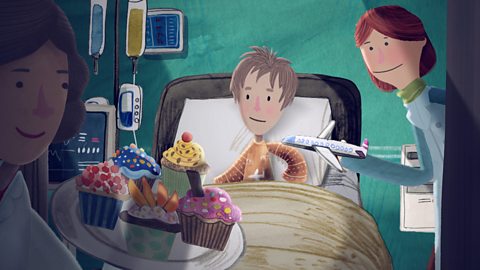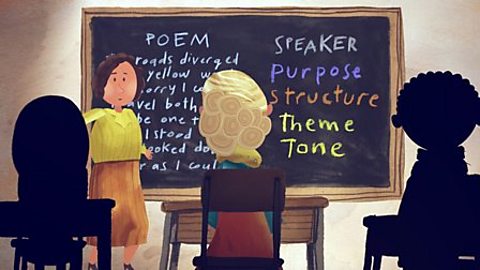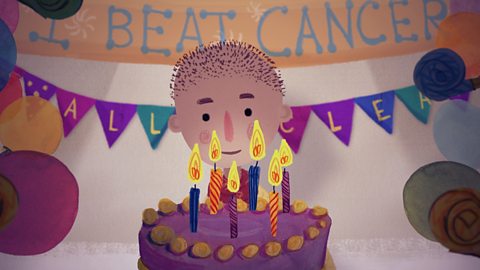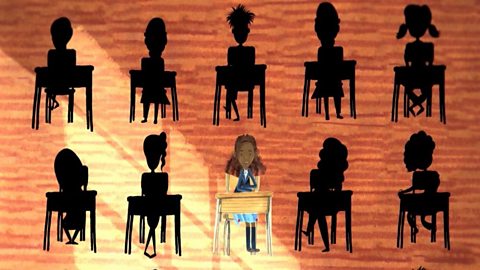IZZY: Hi, my name's Izzy and I’ve got anaphylaxis which is an illness, where you’re so allergic to something that you eat or come in contact with that item, your body would automatically say “Oh no! I don’t like that!”
So you'll get like a shaky feeling and your mouth goes a bit dry and then your tongue starts to get really, really sore and it tingles. And then your lips would start swelling up and you get hives all over you and then I’d got a really, really bad headache and a tummy ache, so I’m severely allergic to nuts.
BEN: Hi, I’m Ben. I’m allergic to shellfish and kiwi and I’m anaphylactic to Brazil nuts, cashew nuts, peanuts… all nuts.
So, we were having a meal, me and my sisters and my mom had made it and I had some and at first I felt fine and said “Oh, I really like this!” and then next it’s that I was upstairs, outside my mum’s bedroom and she was calling an ambulance… and then I remember getting in the ambulance and they had to give me a mask so that I could breathe.
IZZY: I get really, really anxious if I go to a market or something. I get really, really scared and I normally just kind of tug myself up and away from everything on the sides because anything…
Basically anything could happen.
Like if we went to a restaurant and they hadn’t cleaned the tables and somebody was eating nuts beforehand, I’d be likely to have a reaction.
If we are on a plane or something and somebody is eating nuts next to me, I’d probably get anxious still.
BEN: Sometimes I feel really safe because sometimes they announce there’s no nuts serving on the plane and then they end up having nuts so you get really annoyed. So they gave me a face mask. It was so that no nuts in the air could get into my system.
So it was really… annoying.
IZZY: Sometimes, some people have sleepovers and say “Oh Izzy, you can’t come because we are going to have Nutella for breakfast,” and stuff like that and it makes me feel really upset and it’s like I can’t help it. it’s just how I am!
BEN: I have to bring an EpiPen around with me everywhere and an EpiPen is… You get it out and you put it on a part of your body and you hold it there for ten seconds.
IZZY: Then you take it out and just lay them down, if it’s worked. if it hasn’t, let’s give them a second one and that would probably work.
BEN: You’ve kind of got to trust your instincts, so if you read something and you think “Oh, it says might contain nuts”, it looks a bit nutty and you think: “Can’t eat that”.
IZZY: It’s weird because whenever I’m near a nut or something, I can sense it.
You get a thing in your body that’s kind of going round and round and it’s telling you: “Oh, don’t! Don’t! Don’t!” You just get a voice in your head saying: “Izzy, don’t go over there! Don’t! Don’t” and you kind of get like a… a butterfly feeling through your body.
It was my birthday party and it was chocolate ice cream and as soon as I looked to it I said “I can’t have it”. So luckily, I saved my birthday and my whole life!
Video summary
A powerful and beautifully animated documentary using first-person testimony from two children, Ben and Izzy, who both suffer with anaphylactic allergies.
Izzy describes what anaphylaxis is and what it does to your body. Together they describe the different ways it influences their daily lives.
Using the children’s first-person testimonies creates an intimate and direct tone that will help your pupils to empathise with people’s differences.
Izzy describes the anxiety she feels when she’s in an environment that she can’t control; a market place, or the school cafeteria. As well as the isolation that it can cause from friends and non-sufferers.
Ben clearly describes the frustration that can occur when his allergy is ignored. Both circumstances are easily relatable as they talk about school, family, friends, holidays and birthday parties.
This clip is from the series: I Can't Go To School Today.
Teacher Notes
Key Stage 2:
You could use this short film to start a discussion with your pupils about what anaphylaxis is and how it can affect someone that suffers from it.
Key Stage 3 / 4:
You could ask your pupils to suggest how they can be more accepting of each other's differences. Discuss these suggestions as a class and ask how they could apply them to other situations as well.
This short film will be relevant for teaching KS2, KS3 and KS4 in England, Wales and Northern Ireland and at 2nd, 3rd and 4th Level in Scotland.
Jasper's Story - Living with cystic fibrosis. video
Jasper, a boy who lives with cystic fibrosis, explains what his condition is, the treatment he receives and the emotional challenges he faces.

Summer's Story - Living with epilepsy. video
Summer explains the different forms of epilepsy that she suffers from; absent seizures and tonic clonic seizures.

Naomi's Story - Living with leukaemia. video
Naomi is a nine-year-old girl who has recently been cured of leukaemia. Naomi explains her diagnosis, her treatment (including chemotherapy and radiation therapy), and her recovery.

Melissa's Story - Living with HIV. video
Melissa, a child living with HIV, explains what it is, how she was diagnosed, the medication she takes and the physical effect of the virus.
